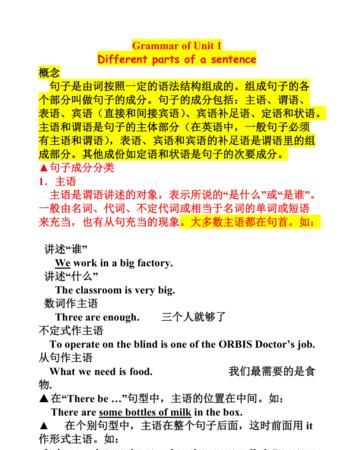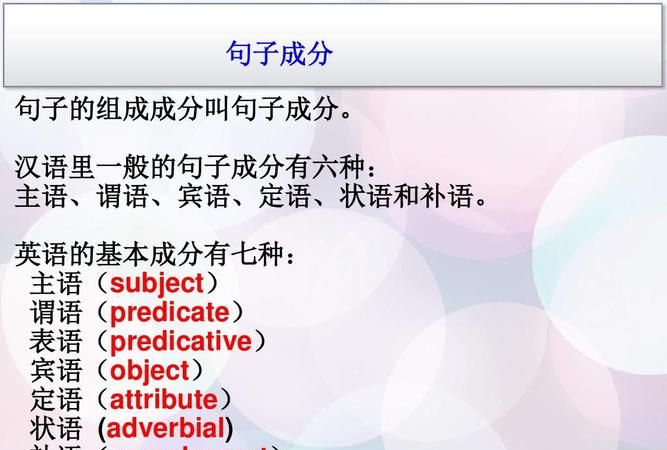本文目录
英语句子翻译技巧和方法
1、主语:主语说明谓语所表示的动作或状态的执行者。名词(短语)、代词、数词、不定时(短语)、动名词(短语)和从句均可充当主语。
例句:A light wind disturbed the surface of the water.微风使水面泛起涟漪。(名词短语作主语)
2、谓语:谓语用来描述主语的行为动作或所处的状态。谓语的中心词是限定动词,有人称、数和时态的变化。
例句:I have tried this way three times.我用这种方法试了三次。
3、表语:表语与前面的系动词一起构成复合谓语,用来说明主语的特征、类属、状态、身份等。
例句:Anita is a Canadian.安妮塔是加拿大人。(名词作表语)
4、宾语:宾语有单宾语、双宾语、复合宾语等,双宾语又分为直接宾语和间接宾语。
例句:We love pace.我们热爱和平。(直接宾语)
5、同位语:对句子中某一成分作进一步解释说明。
例句:They each can get a chance to travel by air.(代词作同位语)
6、定语:定语是用来描述名词或代词的修饰语。
例句:It is a difficult problem.这是一个棘手的问题。(形容词作前置定语)
7、状语:状语是用来修饰动词、形容词、副词和句子的一种成分。
例句:Arriving there,call me up.到了之后,给我来个电话。(现在分词作状语)

句子的成分和基本句型例句
在英文中句子成分包括:主语、谓语、宾语、表语、定语和状语、宾语补足语等。常见的句型有:
1、主语+谓语.
2、主语+谓语+宾语.
3、主语+谓语+间接宾语+直接宾语.
4、主语+谓语+宾语+宾语补足语.
5、主语+系动词+表语.
扩展资料
句型1: Subject (主语) + Verb (谓语):

这种句型中的动词大多是不及物动词,所谓不及物动词,就是这种动词后不可以直接接宾语。
1) Li Ming works very hard.李明学习很努力。
2) The accident happened yesterday afternoon.事故是昨天下午发生的。
句型2:Subject (主语) + Link. V(系动词) + Predicate(表语)
这种句型主要用来表示主语的特点、身份等。其系动词一般可分为下列两类:
(1)表示状态。这样的词有:be, look, seem, smell, taste, sound, keep等。如:
This kind of food tastes delicious.这种食物吃起来很可口。
(2)表示变化。这类系动词有:become, turn, get, grow, go等。如:
Spring comes. It is getting warmer and warmer.春天到了,天气变得越来越暖和。
句型3:Subject(主语) + Verb (谓语) + Object (宾语)
这种句型中的动词一般为及物动词, 所谓及物动词,就是这种动词后可以直接接宾语,其宾语通常由名词、代词、动词不定式、动名词或从句等来充当。
例:
1) He took his bag and left.(名词) 他拿着书包离开了。
2) Li Lei always helps me when I have difficulties. (代词)当我遇到困难时,李雷总能给我帮助。
3) I don’t know what I should do next. (从句)我不知道下一步该干什么。
注意:英语中的许多动词既是及物动词,又是不及物动词。
四、句型4: Subject(主语)+Verb(谓语)+ Indirect object(间接宾语)+Direct object (直接宾语)
这种句型中,直接宾语为主要宾语,表示动作是对谁做的或为谁做的,在句中不可或缺,常常由表示“物”的名词来充当;间接宾语也被称之为第二宾语,去掉之后,对整个句子的影响不大,多由指“人”的名词或代词承担。引导这类双宾语的常见动词有:buy, pass, lend, give, tell, teach, show, bring, send等。如:
1) Her father bought her a dictionary as a birthday present.她爸爸给她买了一本词典作为生日礼物。
2)The old man always tells the children stories about the heroes in the Long March.
老人经常给孩子们讲述长征途中那些英雄的'故事。 上述句子还可以表达为:
1)Her father bought a dictionary for her as a birthday present.
2)The old man always tells stories about the heroes to the children in the Long March.
五、句型5: Subject(主语)+Verb (动词)+Object (宾语)+Complement(补语)
这种句型中的“宾语 + 补语”统称为“复合宾语”。宾语补足语的主要作用或者是补充、说明宾语的特点、身份等;或者表示让宾语去完成的动作等。担任补语的常常是名词、形容词、副词、介词短语、分词、动词不定式等。如:
1)You should keep the room clean and tidy. 你应该让屋子保持干净整洁。(形容词)
2) We made him our monitor.(名词)我们选他当班长。
3) His father told him not to play in the street.(不定式)他父亲告诉他不要在街上玩。
初中英语成分例句分析及详解
1. 主语(subject):句子说明的人或事物。
The sun rises in the east (名词) He likes dancing. (代词)
Twenty years is a short time in history. (数词) Seeing is believing. (动名词)
To see is to believe.(不定式) What he needs is a book.(主语从句)
It is very clear that the elephant is round and tall like a tree.
(It形式主语,主语从句是真正主语)
(一)指出下列句中主语的中心词
① The teacher with two of his students is walking into the classroom.
② There is an old man coming here.
③ The useful dictionary was given by my mother last year.
④ To do today's homework without the teacher's help is very difficult.
2. 谓语(predicate):是对主语加以陈述,表示主语的行为或状态,常用动词或者动词词组担任,放在主语的后面。
We study English. He is asleep.
(二). 选出句中谓语的中心词
① I don't like the picture on the wall. A. don't B. like C. picture D. wall
② The days get longer and longer when summer comes. A. get B. longer C. days D. summer
③ Do you usually go to school by bus? A. Do B. usually C. go D. bus
④ There will be a meeting at the library this afternoon.
A. will be B. meeting C. the library D. afternoon
⑤ Did the twins have porridge for their breakfast? A. Did B. twins C. have D. breakfast
3. 表语(predicative):系动词之后的成分,表示主语的性质、状态和特征。
He is a teacher. (名词) Seventy-four! You don’t look it. (代词)
Five and five is ten. (数词) He is asleep. (形容词)
His father is in.(副词) The picture is on the wall. (介词短语)
My watch is gone / missing / lost. (形容词化的分词)
The question is whether they will come. (表语从句)
(常见的系动词有: be, sound(听起来), look(看起来), feel(摸起来,smell(闻起来), taste(尝、吃起来), remain(保持,仍是), feel(感觉)……
It sounds a good idea. The sound sounds strange.
Her voice sounds sweet. Tom looks thin.
The food smells delicious. The food tastes good.
The door remains open. Now I feel tired.
(三) 挑出下列句中的表语
① The old man was feeling very tired. ② Why is he worried about Jim?
③ The leaves have turned yellow. ④ Soon They all became interested in the subject.
⑤ She was the first to learn about it.
4. 宾语:1)动宾表示行为的对象,常由名词或者代词担任。放在及物动词或者介词之后。如:
I like China. (名词) He hates you. (代词)
How many do you need? We need two. (数词)I enjoy working with you. (动名词)
I hope to see you again. (不定式) Did you write down what he said? (宾语从句)
2) 介词后的名词、代词和动名词-----介宾
Are you afraid of the snake? Under the snow, there are many rocks.
3) 双宾语-----间宾(指人)和直宾(指物)
He gave me a book yesterday. Give the poor man some money.
(四) 挑出下列句中的宾语
① My brother hasn't done his homework.
② People all over the world speak English.
③ You must pay good attention to your pronunciation.
④ How many new words did you learn last class?
⑤ Some of the students in the school want to go swimming, how about you?
5. 宾补:对宾语的补充,全称为宾语补足语。
We elected him monitor. (名词) We all think it a pity that she didn’t come here. (名词)
We will make them happy. (形容词) We found nobody in. ( 副词 )
Please make yourself at home. (介词短语) Don’t let him do that. (省to不定式)
His father advised him to teach the lazy boy a lesson. (带to不定式)
Don’t keep the lights burning. (现在分词) I’ll have my bike repaired. (过去分词)
(五) 挑出下列句中的宾语补足语
① She likes the children to read newspapers and books in the reading-room.
② He asked her to take the boy out of school.
③ She found it difficult to do the work.
④ They call me Lily sometimes.
⑤ I saw Mr. Wang get on the bus.
⑥ Did you see Li Ming playing football on the playground just now?
6. 定语:修饰或限制名词或代词的词、词组或句子。
Ai Yanling is a chemistry teacher.(名词) He is our friend. (代词)
We belong to the third world.(数词) He was advised to teach the lazy boy a lesson.(形容词)
The man over there is my old friend.(副词)
The woman with a baby in her arms is my sister. (介词)
The boys playing football are in Class 2. (现在分词)
The trees planted last year are growing well now. (过去分词)
I have an idea to do it well.(不定式) You should do everything that I do. (定语从句)
(六) 挑出下列句中的定语
① They use Mr., Mrs. with the family name.
② What is your given name?
③ On the third lap are Class 1 and Class 3.
④ I am afraid some people forgot to sweep the floor.
⑤ The man downstairs was trying to sleep.
7. 状语:用来修饰v., adj., adv., or 句子。表示时间、地点、原因、目的、结果、程度、条件、方式和让步。(以下例句按上述顺序排列)
I will go there tomorrow. The meeting will be held in the meeting room.
The meat went bad because of the hot weather. He studies hard to learn English well.
He didn’t study hard so that he failed in the exam. I like some of you very much.
If you study hard, you will pass the exam. He goes to school by bike.
Though he is young, he can do it well.
(七) 挑出下列句中的状语
① There was a big smile on her face.
② Every night he heard the noise upstairs.
③ He began to learn English when he was eleven.
④ The man on the motorbike was travelling too fast.
⑤ With the medicine box under her arm, Miss Li hurried off.
(八) 划出句中的直接宾语和间接宾语
① Please tell us a story.
② My father bought a new bike for me last week.
③ Mr. Li is going to teach us history next term.
④ Here is a pen. Give it to Tom.
⑤ Did he leave any message for me?
参 考 答 案
(一) ① teacher ② man ③ dictionary ④ To do
(二) ① B ② A ③ C ④ A ⑤ C
(三) ① tired ② worried ③ yellow ④ interested ⑤ first
(四) ① his homework ② English ③ your pronunciation ④ new words ⑤ to go swimming
(五) ① to read newspapers and books in the reading-room ② to take the boy out of school
③ Lily ④ get on the bus ⑤ playing football on the playground
(六) ① family ② given ③ third ④ some ⑤ downstairs
(七) ① on the face ② Every night ③ when he was eleven ④ fast ⑤ off
(八) ① us, 间接宾语 a story, 直接宾语 ② me, 间接宾语 a new bike, 直接宾语
③ us, 间接宾语 history, 直接宾语 ④ Tom, 间接宾语 it, 直接宾语
⑤ me, 间接宾语 message, 直接宾语

英语句法成分有哪些
句子成分的定义
构成句子的各个部分叫做句子成分。句子成分有主要成分和次要成分;主要成分有主语和谓语;次要成分有表语、宾语、定语、状语、补足语和同位语。
英语语法句子成分分析:主语
主语是一个句子所叙述的主体,一般位于句首。但在there be结构、疑问句(当主语不疑问词时)和倒装句中,主语位于谓语、助动词或情态动词后面。主语可由名词、代词、数词、不定式、动名词、名词化的形容词和主语从句等表示。例如:
During the 1990s, American country music has become more and more popular.(名词)
We often speak English in class.(代词)
One-third of the students in this claare girls.(数词)
To swim in the river is a great pleasure.(不定式)
Smoking does harm to the health.(动名词)
The rich should help the poor.(名词化的形容词)
When we are going to have an English test has not been decided.(主语从句)
It is necessary to master a foreign language.(it作形式主语,真正的主语为后面的不定式)
英语语法句子成分分析:谓语
谓语说明主语所做的动作或具有的特征和状态。动词在句中作谓语,一般放在主语之后。谓语的构成如下:
1、简单谓语:由一个动词或动词短语构成。如:He practices running every morning.
2、复合谓语:(1)由情态动词或其他助动词加动词原形构成。如:You may keep the book for two weeks. He has caught a bad cold. (2)由系动词加表语构成。如:We are students.
英语语法句子成分分析:表语
表语用以说明主语的身份、特征和状态,它一般位于系动词(如be, become, get, look, grow, turn, seem等)之后。表语一般由名词、代词、形容词、分词、数词、不定式、动名词、介词短语、副词及表语从句表示。例如:
Our teacher of English is an American.(名词)
Is it yours?(代词)
The weather has turned cold.(形容词)
The speech is exciting.(分词)
Three times seven is twenty one?(数词)
His job is to teach English.(不定式)
His hobby(爱好)is playing football.(动名词)
The machine must be out of order.(介词短语)
Time is up. The clais over.(副词)
The truth is that he has never been abroad.(表语从句)
英语语法句子成分分析:宾语
宾语表示动作的对象或承爱者,一般位于及物动词和介词后面。例如:
They went to see an exhibition(展览)yesterday.(名词)
The heavy rain prevented me form coming to school on time.(代词)
How many dictionaries do you have? I have five.(数词)
They helped the old with their housework yesterday.(名词化形容词)
He pretended not to see me.(不定式短语)
I enjoy listening to popular music.(动名词短语)
I think(that)he is fit for his office.(宾语从句)
宾语种类:(1)双宾语(间接宾语+直接宾语),例如:Lend me your dictionary, please.(2)复合宾语(宾语+宾补),例如:They elected him their monitor.
英语语法句子成分分析:宾语补足语
英语中有些及物动词,除有一个直接宾语以外,还要有一个宾语补语,才能使句子的意义完整。带有宾语补足语的一般句型为:某些及物动词(如make等+宾语+宾补)。宾补可由名词、形容词、副词、不定式、分词、介词短语和从句充当。例如:
His father named him Dongming.(名词)
They painted their boat white.(形容词)
Let the fresh air in.(副词)
You mustn't force him to lend his money to you.(不定式短语)
We saw her entering the room.(现在分词)
We found everything in the lab in good order.(介词短语)
We will soon make our city what your city is now.(从句)
英语语法句子成分分析:定语
修饰名词或代词的词、短语或从句称为定语。定语可由以下等成分表示:
Guilin is a beautiful city.(形容词)
China is a developing country; America is a developed country.(分词)
There are thirty women teachers is our school.(名词)
His rapid progrein English made us surprised.(代词)
Our monitor is always the first to enter the classroom.(不定式短语)
The teaching plan for next term has been worked out.(动名词)
He is reading an article about how to learn English.(介词短语)

以上就是关于英语句子成分详解及例句,英语句子翻译技巧和方法的全部内容,以及英语句子成分详解及例句 的相关内容,希望能够帮到您。

